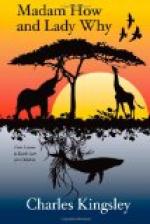Of course not; he brings it and lays it down at our feet.
Because he likes better to do his duty, and be praised for it, than to eat the rabbit, dearly as he longs to eat it.
But he is only an animal. Who taught him to be generous, and dutiful, and faithful?
Who, indeed! Not we, you know that, for he has grown up with us since a puppy. How he learnt it, and his parents before him, is a mystery, of which we can only say, God has taught them, we know not how. But see what has happened—that just because dogs have learnt not to be selfish and to compete—that is, have become civilised and tame—therefore we let them live with us, and love them. Because they try to be good in their simple way, therefore they too have all things added to them, and live far happier, and more comfortable lives than the selfish wolf and fox.
But why have not all animals found out that?
I cannot tell: there may be wise animals and foolish animals, as there are wise and foolish men. Indeed there are. I see a very wise animal there, who never competes; for she has learned something of the golden lesson—that it is more blessed to give than to receive; and she acts on what she has learnt, all day long.
Which do you mean? Why, that is a bee.
Yes, it is a bee: and I wish I were as worthy in my place as that bee is in hers. I wish I could act up as well as she does to the true wisdom, which is self-sacrifice. For whom is that bee working? For herself? If that was all, she only needs to suck the honey as she goes. But she is storing up the wax under her stomach, and bee-bread in her thighs—for whom? Not for herself only, or even for her own children: but for the children of another bee, her queen. For them she labours all day long, builds for them, feeds them, nurses them, spends her love and cunning on them. So does that ant on the path. She is carrying home that stick to build for other ants’ children. So do the white ants in the tropics. They have learnt not to compete, but to help each other; not to be selfish, but to sacrifice themselves; and therefore they are strong.
But you told me once that ants would fight and plunder each other’s nests. And once we saw two hives of bees fighting in the air, and falling dead by dozens.
My child, do not men fight, and kill each other by thousands with sharp shot and cold steel, because, though they have learnt the virtue of patriotism, they have not yet learnt that of humanity? We must not blame the bees and ants if they are no wiser than men. At least they are wise enough to stand up for their country, that is, their hive, and work for it, and die for it, if need be; and that makes them strong.
But how does that make them strong?




